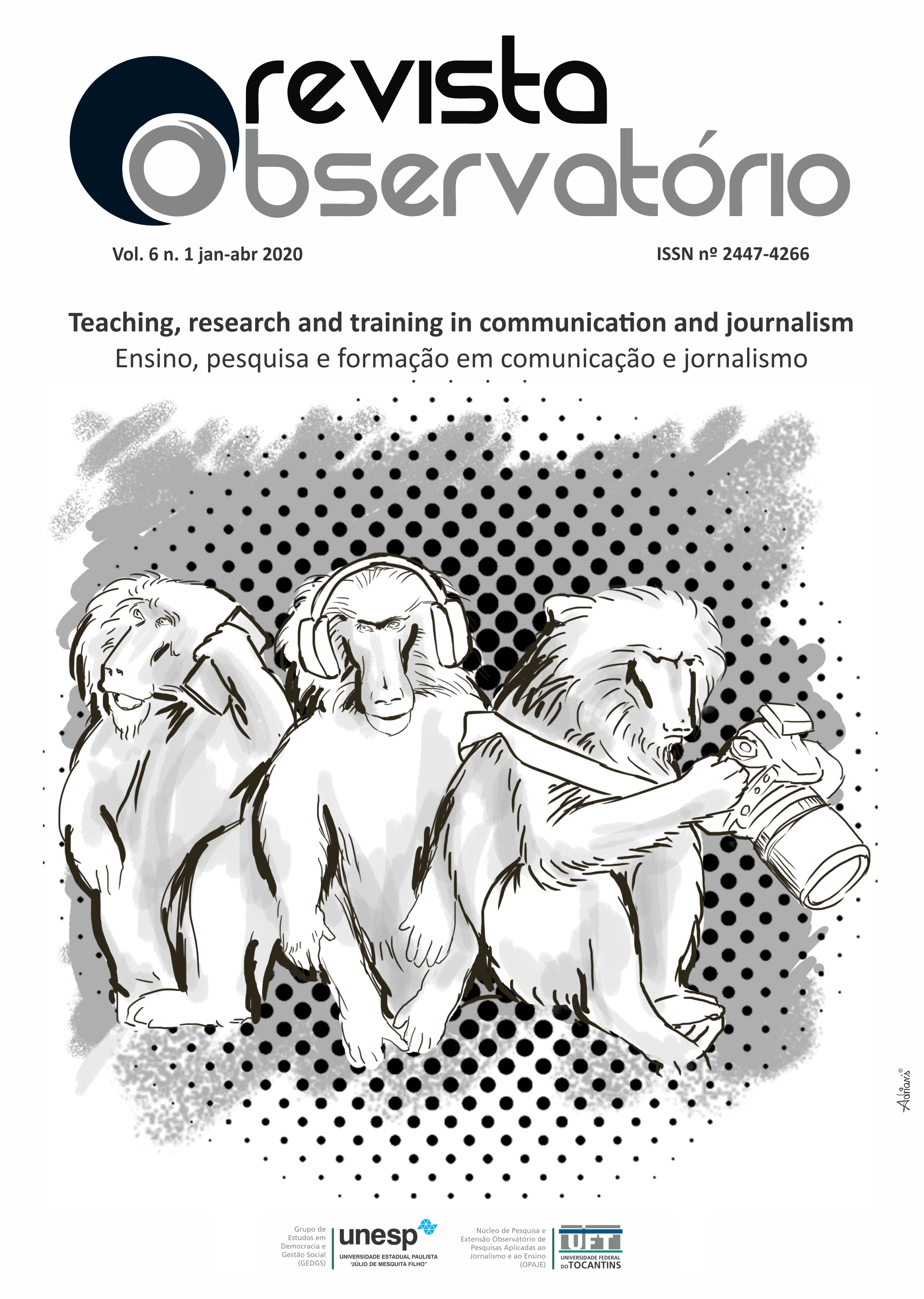Teaching of sociology of communication and formative perceptions
DOI:
https://doi.org/10.20873/uft.2447-4266.2020v6n1a3enPalavras-chave:
comunicaçãoResumo
Astonished people around the world scrutinize news programs for reliable information about the terrible Covid19 pandemic in an avalanche of false news about the reality of the facts. Real news can be the difference between living or dying for millions of people across the globe although access to real news may be the privilege of a few. News varies on the lethality of the disease, preventive measures and medications that can have an effect on the treatment of the condition, but it is also in this aspect that the peripheral citizens of peripheral countries are the most affected when it comes to reliable information.
Downloads
Referências
BBC. Available at <https://www.bbc.com/portuguese/internacional-52205918.
>. Accessed April 10, 2020.
COVID PANDEMIA19. Available at <https://en.wikipedia.org/wiki/Pandemia_de_COVID-19>. Accessed April 15, 2020.
DATA SHEET. Available at <http://datafolha.folha.uol.com.br/opiniaopublica/2020/04/1988651-28-nao-estao-em-isolamento-social-contr-coronavirus.shtml>. Accessed April 10, 2020.
FIDALGO, A. Teaching journalism in and for the 21st century. Communication given at the International Congress on Journalism and Internet, University of Coimbra, March 28 and 29, 2001. . Access 19 out. 2016.
IBGE - Brazilian Institute of Geography and Statistics. Available at <https://www.ibge.gov.br/apps/populacao/projecao/index.html?utm_source=portal&utm_medium=popclock&utm_campaign=novo_popclock>. Accessed April 10, 2020.
JAMBEIRO, O.; PALÁCIOS, M. Brazilian perspectives in digital environments: communication policies, e-government, and digital journalism. Salvador, BA: EDUFBA, 2010.
LARANJEIRA, A.; QUADROS, C.; CAETANO, K. The teaching of digital journalism: methodologies that build a discipline. In: Teaching journalism in the era of convergence: concepts, methodology and case studies in Brazil. Elias Machado (Org.). Salvador: EDUFBA, 2011. P. 127-149.
LÉVI-STRAUSS, C. Cultural sociology, and its teaching. PLURAL, Journal of the Graduate Program in Sociology at USP, São Paulo, v.19.2, 2012, pp.129-137 Available at <https://www.researchgate.net/publication/285546351_A_sociologia_cultural_e_seu_ensino>. Accessed 17 April 2020.
MACHADO, E. Preface. Teaching journalism in the era of convergence: concepts, methodology, and case studies in Brazil. Elias Machado (Org.). Salvador: EDUFBA, 2011. P. 7.
MELO, J. M. de. The nature of journalism and the mission of the journalist according to Costa Rego. Available at <http://www.portcom.intercom.org.br/pdfs/24c0adbd2ecb31b4737709c8dac85350.pdf>. Accessed April 15, 2020.
MELO, A. S. e. (2017). Enquadramento histórico legal do processo de bolonha e o seu impacto no sistema de ensino superior português. Revista Observatório, 3(6), 75-141. https://doi.org/10.20873/uft.2447-4266.2017v3n6p75.
MOIO, I., Alcoforado, L., & VIEIRA, C. C. (2017). A declaração de Bolonha e o reforço da abertura do ensino superior a novos públicos: perceções de pessoas adultas que frequentam a Universidade de Coimbra. Revista Observatório, 3(6), 169-201. https://doi.org/10.20873/uft.2447-4266.2017v3n6p169.
NUNES, S. G., PORTO JUNIOR, F. G. R., & MORAES, N. R. de. (2017). Conhecimento e organização: indicativos pós-Bolonha de uma sociedade em construção. Revista Observatório, 3(6), 338-353. https://doi.org/10.20873/uft.2447-4266.2017v3n6p338.
PORTO JUNIOR, F. G. R., & MORAES, N. R. de. (2017). Formando pesquisadores pós-Bolonha em Portugal: relações entre a formação de graduação e o campo da pesquisa/investigação. Revista Observatório, 3(6), 202-228. https://doi.org/10.20873/uft.2447-4266.2017v3n6p202.
REIS, E. G. dos. (2017). O ensino superior em cabo verde e os desafios do processo de Bolonha. Revista Observatório, 3(6), 142-168. https://doi.org/10.20873/uft.2447-4266.2017v3n6p142.
PUBLIC. Available at <https://www.publico.pt/2020/04/14/economia/noticia/fmi-confinamento-sera-pior-recessao-desde-depressao-1912225>. Accessed April 15, 2020.
COVID PANDEMIA19. Available at <https://en.wikipedia.org/wiki/Pandemia_de_COVID-19>. Accessed April 15, 2020.
RODRIGUES, J. M. Teaching and training in communication and journalism: a study on the sociology of communication discipline in journalism courses in Brazil and Portugal. Palmas, TO, 2018. Advisor: Prof. Dr. Francisco Gilson Rebouças Pôrto Júnior. Thesis (Master's degree).
THE LANCET. Covid19: learning from experience. Editorial. Volume 395, ISSUE 10229, P1011, March 28, 2020. Available at <https://www.thelancet.com/journals/lancet/article/PIIS0140-6736 (20) 30686-3 / full text>. Accessed April 16, 2020.
TEIXEIRA, P. O. The teaching of journalism in Portugal a history and analysis of curricular plans. Porto, 2009-2010. Supervisor: Prof. Dr. Jorge Pedro Sousa. Thesis (Master's degree). Fernando Pessoa University. 165 f. Available at <http://bdigital.ufp.pt/bitstream/10284/1681/2/DM_19061.pdf>. Access 04 set. 2017.
TEIXEIRA, P. O. Studies in Journalism and Media - Vol. 9 Nº 2 - July to December 2012. Access 09 Sep. 2016.
TEIXEIRA, T. Pedagogical projects in times of change in journalism. In: Teaching journalism in the era of convergence: concepts, methodology, and case studies in Brazil. Elias Machado (Org.). Salvador: EDUFBA, 2011. P. 17-31.
THOMPSON, J. B. Ideology, and modern culture: critical social theory in the era of mass media. 9. ed. Petrópolis, RJ: Vozes, 2011.
WARDLE, C.; DERAKHSHAN, H. Information Disorder. Toward an interdisciplinary framework for research and policymaking. Available at <https://rm.coe.int/information-disorder-report-november-2017/1680764666>. Accessed April 15, 2020.
WESTCOTT, B. China issues a previous list of animals that can be raised for meat consumption. Available at <https://www.cnnbrasil.com.br/internacional/2020/04/10/china-emite-lista-previa-de-animais-que-podem-ser-criados-para-consumo-da-carne >. Accessed 17 April 2020.
WOLTON, D; MOURA, D.; ADGHIRNI, Z. L. Thinking about communication. Brasília, DF: Ed. UnB. 2004.
Publicado
Como Citar
Edição
Seção
Licença
[PT] Autores que publicam nesta revista concordam com os seguintes termos:
1. Autores mantém os direitos autorais e concedem à revista, sem pagamento, o direito de primeira publicação, com o trabalho simultaneamente licenciado sob a Creative Commons Attribution License (CC BY-NC 4.0), permitindo o compartilhamento do trabalho com reconhecimento da autoria do trabalho e publicação inicial nesta revista.
Leia todos os termos dos direitos autorais aqui.


